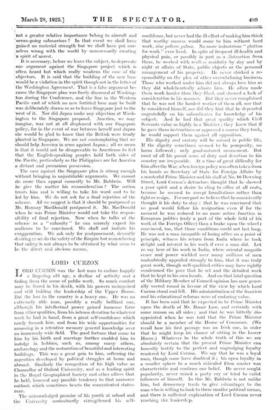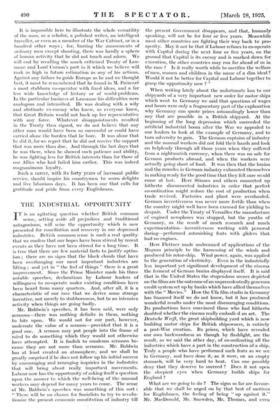LORD CURZON FORD. CURZON was the last man to endure
happily a lingering old age, a decline of activity and a fading from the scene of public work. So much comfort may be found in his death, with his powers unimpaired and still holding the leadership of the Upper House. But the loss to the country is a heavy one. He was an extremely able man, possibly a really brilliant one, although his intellectual power gained immense force from other qualities, from his intense devotion to whatever work he had in hand, from a great self-confidence which rarely forsook him, and from his wide opportunities for amassing in a retentive memory- general knowledge over an immensely wide field. The good fortune that came to him by his birth and marriage further enabled him to indulge in hobbies, such as, among many others, archaeology and the restoration of beautiful and interesting buildings. This was a great gain to him, softening the asperities developed by political struggles at home and abroad: Similarly the recognition of his high value as Chancellor of Oxford University, and as a leading spirit in the Royal Geographical Society and other offices that he held, lessened any poSsible tendency to that narrower outlook which sometimes besets the concentrated states- man.
The acknowledged. promise of his .youth at school and the University undoubtedly strengthened his self- confidence, but never had the ill-effect of making him think that worthy success would come to him without hard work, sine pulvere patina. No more industrious " glutton for work " ever lived. In spite of frequent ill-health and physical pain, or possibly in part as a distraction from them, he worked with restless assiduity by day and by night at affairs of State, public objects or the personal management of his property. He never shirked a re- sponsibility on the plea of other overwhelming business. Those who worked under him did not always love him as they did wholeheartedly admire him. He often made them work harder than they liked, and showed a lack of consideration in his manner. But they never complained that he was not the hardest worker of them all, nor that he considered himself, nor did they hint that he depended ungratefully on his subordinates for knowledge of his subject. And he had that great quality which Civil Servants value so highly in a Minister ; they knew that if he gave them instructions or approved a course they took, he would support them against all opposition.
His dignity and oratory will be missed in public life. If the dignity sometimes seemed to be pomposity, no harm followed ; only good-natured amusement. But most of all his proud sense of duty and devotion to his country are irreparable. At a time of great difficulty for him after the 'War, when foreign policy was often taken from his hands as Secretary of State for Foreign Affairs by a masterful Prime Minister and his staff at No. 10 Downing Street, Lord Curzon's detractors thought that he showed a poor spirit and a desire to cling to office at all costs, because he seemed to accept humiliations rather than fight or resign. For our part we believe that he consistently thought it his duty to stay : that he was convinced that no good would follow his resignation even if for the moment he was reduced to no more active function in European politics (only a part of the whole field of his work at the Foreign Office) than a brake upon the wheel convinced, too, that those conditions could not last long. He was not a man incapable of losing office on a point of principle, witness his return from India where he took delight and interest in his work if ever a man did. Let us say here of his work in India, where oriental magnifi- cence and power wielded over many millions of men undoubtedly appealed strongly to him, that it was truly great work, though well-qualified critics may have rightly condemned the pace that he set and the detailed work that he kept in his own hands. And on that fatal question of the Military Member of Council opinion has now gener- ally veered round in favour of the view by which Lord Curzon stood and fell. His administration of the- frontiers and his educational reforms were of enduring value.
It has been said that he expected to be Prime Minister. upon the death of Mr. Bonar Law, and certainly with some reason on all sides ; and that he was bitterly dis- appointed when he was told that the Prime Minister should be a member of the House of Commons. (We recall how his first peerage was an Irish one, in order that he might keep his chance of sitting in the Lower House.) Whatever be the whole truth of this we are absolutely certain that the present Prime Minister can honestly testify to the perfect and ungrudging loyalty rendered by Lord Curzon. We say that he was a loyal man, though some have doubted it ; his open loyalty in a smaller sphere to a much ridiculed Eton master was characteristic and confirms our belief. He never sought popularity, never raised a party cry or tried to enlist followers of himself. In this Mr. Baldwin is not unlike him, but democracy tends to give advantages to the man who is willing to look to these smaller political means, and there is sufficient explanation of Lord Curzon never reaching the leadersh:p. It is impossible here to illustrate the whole versatility of the man, as a scholar, a polished writer, an intelligent traveller, or even as a member of the War Cabinet, or in a hundred other ways ; for, barring the amusements of ordinary men except shooting, there was hardly a sphere of human activity that he did not touch and adorn. We will end by recalling the much criticized Treaty of Lau- sanne and Lord Curzon's part in it which we believe will rank as high in future estimation as any of his actions. Against any failure to guide" Europe as he and we thought best, it must be remembered that he found in M. Poineare a most stubborn co-operator with fixed ideas, and a far less wide knowledge of history or of world-problems. In the particular business at Lausanne his difficulties were analogous and intensified. He was dealing with a wily and obstinate ex-enemy who knew, as everyone knew, that Great Britain would not back up her representative with any force. Whatever diSappointments resulted in the Treaty then signed, we do not believe that any Other man would have been so successful or could have carried alone the burden that he bore. It was alone that he did it, for we regret that he did not receive the support that was more than due. And through the last days that lie was there, when he showed such patience and ability, he was fighting less for British interests than for those of our Allies who had failed him earlier. This was indeed magnanimous loyalty.
Such a career, with its forty years of incessant public service, should inspire his countrymen to scorn delights and live laborious days. It has been one that calls for gratitude and pride from every Englishman.















































 Previous page
Previous page